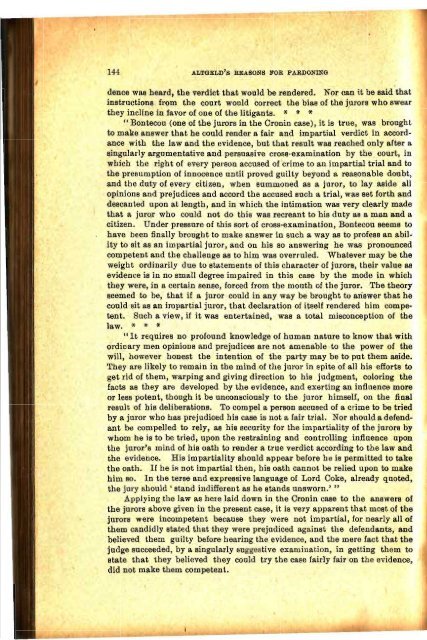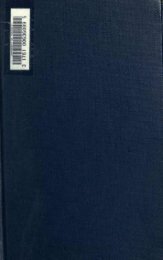The Chicago Martyrs by John P. Altgeld
The Chicago Martyrs by John P. Altgeld
The Chicago Martyrs by John P. Altgeld
You also want an ePaper? Increase the reach of your titles
YUMPU automatically turns print PDFs into web optimized ePapers that Google loves.
144<br />
ALTGELD'S REASONS FOR PARDONING<br />
FIELDEN, NEEBE AND SCHWAB.<br />
145<br />
dence was heard, the verdict that would be rendered.<br />
Nor can it be said that<br />
instructions from the court would correct the bias of the jurors who swear<br />
they incline in favor of one of the litigants. * * * I<br />
"Bontecou (one of the jurors in the Cronin case), it is true, was brought<br />
to make answer that he could render a fair and impartial verdict in accordance<br />
with the law and the evidence, but that result was reached only after a<br />
s,ingularly argumentative and persuasive cross·examination <strong>by</strong> the court, in<br />
which the right of every pel'son accused of 'crime to an impartial trial and to<br />
the presumption of innocence until proved guilty beyond a reasonable doubt,<br />
and the duty of every citizen, when summoned as a juror, to lay aside all<br />
opinions and prejudices and accord the accused such a trial, was set forth and<br />
descanted upon at length, and in which the intimation was very clearly made<br />
that a jurol who could not do this was recreant to his duty as a man and a<br />
citizen. Under pressure of this sort of cross-examination, Bontecou seems to<br />
have been finally brought to make answer in such a way as to profess an abi!<br />
,ity to sit as an impartial juror, and on his so answering he was pronounced<br />
competent and the challenge as to him was overruled. Whatever may be the<br />
weight ordinarily due to statements of this character of jurors, their value as<br />
evidence is in no small degree impaired in this case <strong>by</strong> the mode in which<br />
I they were, in a certain sense, forced from the mouth of the juror. <strong>The</strong> theory<br />
seemed to be, that if a juror·could in any way be brought to answer tbat he<br />
could sit as an impartial juror, that declaration of itself rendered him competent.<br />
Such a view, if it was entertained, was a total misconception of the<br />
law. * * *<br />
"It requires no profound knowledge of human nature to know that with<br />
ordinary men opinions and prejudices are not amenable to the power of the<br />
will, however bonest tbe intention of the party may be to put them aside.<br />
<strong>The</strong>y are likely to remain in the mind of the juror in spite of all his efforts to<br />
get rid of them, warping and giving direction to his judgment, coloring the<br />
facts as they are developed <strong>by</strong> the evidence, and exerting an influence more<br />
or less potent, tbough it be unconsciously to the juror himself, on the final<br />
result of his deliberations. To compel a person accused of a crime to be tried<br />
<strong>by</strong> a juror who has prejudiced bis case is not a fair trial. Nor sbould a defendant<br />
be compelled to rely, as his security for the impartiality of the jurors <strong>by</strong><br />
whom he is to be tried, upon the restraining and controlling influence upon<br />
the juror's mind of his oath to render a true verdict according to the law and<br />
the evidence. His impartiality should appear before he is permitted to take<br />
the oath. If he if; not impartial then, his oath cannot be relied upon to make<br />
him so. In the terse and expressive language of Lord Coke, already quoted,<br />
the jury should' stand indifferent as he stands unsworn.' "<br />
Applying the law as heleJaid down in the Cronin case to the answers of<br />
the jurors above given in the presen~ case, it is very apparent that most of the<br />
jurors were incompetent because they were not impartial, for nearly all of<br />
them candidly stated that they were prlljudiced against the defendants, and<br />
believed them guilty before hearing the evidence, and the mere fact that the<br />
judge succeeded, <strong>by</strong> a singularly suggestive examination, in getting them to<br />
state that they believed they could try the case fairly fair on the evidence,<br />
did not make them competent.<br />
It is true that this case was before the Supreme Court, a~d that court<br />
allowed the verdict to stand; and it is also true that in the opinion of the<br />
majority of the court in the Cronin case, an effort is made to distinguish that<br />
case from this one; but it is evident that the court did not have the record of<br />
this case before it when it tried to make the distinction, and the opinion of<br />
the minority of the court in the Cronin case expressly refers to this case as<br />
beinl:( exactly.like that one, so far as relates to the competency of the jurors.<br />
<strong>The</strong> answers of the jurors were almost identical and the examinations were<br />
the same. <strong>The</strong> very things which the Supreme Court held to be fatal.errors<br />
in the Cronin case, constituted the entire fabric of this case, so far as relates<br />
to the competency of the jury. In fact, the trial judge in the Cronin case was<br />
guided <strong>by</strong> the rule laid down in this case, yet the Supreme Court reversed the<br />
Cronin case because two of the jurors were held to be incompetent, each having<br />
testified that he had read and talked about the case, and had formed and<br />
expressed an opinion as to the guilt of the defendants; that he was preju<br />
. diced; that he believed what he had read, and that his prejudice might influence<br />
his verdict; that his prejudice amounted to a conviction on the subject<br />
of the guilt or innocence of the defendants; but each finally said that he could<br />
and would try the case fairly on the evidence alone, etc.<br />
A careful comparison of the examination of these t'fo"jurors with that of<br />
Ipany of the jurors in this case shows that a number of the jQ.rors expressed<br />
themselves,.if anything, more strongly against the defendants than these two<br />
did; and what is still more, one of those summoned, Mr. M. D. Flavin, in<br />
this case, testified not only that he had read and talked about the case, and<br />
had formed and expressed an opinion as to the guilt or innocence of the<br />
defendants, that he was bitterly prejudiced, but further, that he was related<br />
. to one of the men who were killed, and th'at for that reason he felt more<br />
strongly against the defendants than he otherwise might, yet he was held to<br />
be competent on his mere statement that he believed he could try the ca!e<br />
fairly on the evidence.<br />
No matter what the defendants were charged with, they were entitled to<br />
a fair trial, and no greater danger could possibly threaten our i:nstitutionB<br />
than to have the courts of j\lstice run wild or give way to popular clamor; and<br />
when the trial judge in this case ruled that a relative of one of the men<br />
- who was killed was a competent juror, and this after the man had candidly<br />
stated that he was deeply prejudiced, and that his relationship caused him to<br />
feel more strongly than he otherwise might; and when, in scores of instances,<br />
he ruled that men who candidly declared that they believed the defendants<br />
to be guilty, that this was a deep conviction and would influence their verdict,<br />
and that it would require strong evidence to convince them that-the defendants<br />
were innocent; when in all these instances the trial judge ruled that<br />
these men were competent jurors,.simply because they had, under his adroit<br />
manipulation, been led to say that they believed they could try the case fairly, .<br />
on the evidence, then the proceedings lost all semblance of a fair trial.<br />
DOES THE PROOF SHOW G'UILT?<br />
III.<br />
'fhe State has never discovered who it was that threw the bomb which
















